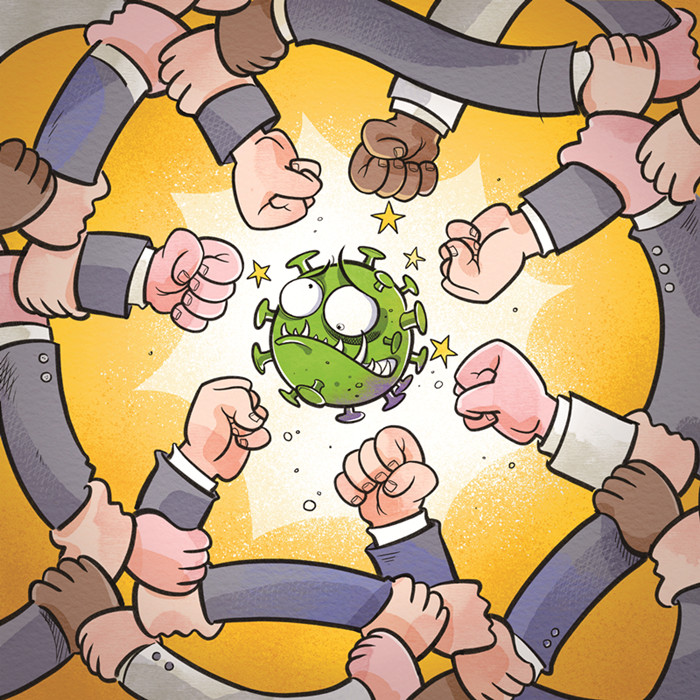Unprecedented efforts for global good


Editor's note: In December 2019, a new coronavirus broke out in Wuhan, Hubei province, and then spread across the country. In a bid to curb the epidemic, the Chinese government made a decision to quarantine Wuhan on Jan 23, and other provinces and cities including Beijing and Shanghai have also taken strict prevention and control measures. Experts at the Shanghai Institutes for International Studies have conducted assessments and analyses of the effectiveness of these measures. The followings are some excerpts from their conclusions:
First, why were mass quarantines exercised on Wuhan and other epidemic areas?
Quarantining a key affected area is an ancient but still the most direct and effective means of controlling an epidemic outbreak, although this also faces risks and challenges. At present, there are no specific drugs or vaccines for recurrent viral infections, including the new coronavirus first reported in Wuhan. So traditional public health strategies are still the most effective means to control large-scale outbreaks of infectious diseases, that is, to control the source of infection, cut off the transmission routes and protect vulnerable populations. Judging from the current medical data, people are generally susceptible to the novel coronavirus. Therefore, in the absence of effective treatment drugs and vaccines, controlling the source of infection to cut off its transmission route remains the only reliable and correct choice.
Quarantining Wuhan was an unprecedented public health decision taken by the Chinese government that reflects China's role as a responsible power. Facts have proved that although the number of confirmed infection cases has been increasing continuously in all Chinese provinces since the implementation of the quarantine measures in Wuhan, the number of confirmed cases has increased much less in other provinces than Hubei, and these increased cases have mainly occurred in Wuhan. Most of the confirmed infections in other provinces have a history of residence and travel in Wuhan or Hubei province, only a few of them have suffered the disease because of close contact with others who have been infected.
Judging from this, tight control of population outflows from Hubei is an effective means of stopping the diffusion of the virus. At present, all provinces have launched a high-level alert system, taking a variety of measures to strictly control and timely detect imported cases and effectively prevent secondary infections. At the same time, the Spring Festival holiday has been extended across the country to reduce people flows to the lowest possible level, and people from the mostly affected epidemic areas have been encouraged to voluntarily report and self-observe at home to curb community-wide dissemination of the virus.
If China does not segregate some key affected areas such as Wuhan, what will be the consequences?
According to international authoritative studies, the high efficiency of the current global transport network can enable infectious pathogens to travel from remote villages to major cities on six continents in 36 hours, potentially igniting massive outbreaks or pandemics.
The major epidemic areas of the new coronavirus are concentrated in and around Wuhan. If the Chinese government had not taken decisive and forceful quarantine measures, the coronavirus outbreak may have spread abroad more rapidly and caused stronger impacts on global health, economy and society. As Tedros Adhanom Ghebreyesus, head of the World Health Organization, said, if it were not for these measures taken by China, more confirmed infections and even deaths would have been seen outside of China.
Second, can the Chinese government manage to contain the epidemic?
Since the outbreak of the epidemic, China has mobilized all government and social resources, forming a network of government, enterprises and society to deal with the outbreak.
The central government has maintained a high alert against the epidemic. After the number of infected patients reached 200 nationwide, the country comprehensively responded to the epidemic. On Jan 20, President Xi Jinping and Premier Li Keqiang urged governments at all levels to seriously monitor the number of cases of pneumonia caused by the new coronavirus, instructing the National Health Commission and local governments to establish an emergency response mechanism. On Jan 25, the central leading group on epidemic response was set up, led by Premier Li. Two days later, Li arrived in Wuhan to inspect and direct the fight against the epidemic.
Rapid mobilization at the central level has accelerated national support for Wuhan and Hubei province. Under the guidance of the central government, most provinces and cities have sent epidemic doctors and nurses to Wuhan and Hubei. So far, about 10,000 medical workers have been sent to Wuhan and Hubei. Some emergency medical resources such as masks, protective clothing and medicines have been mobilized nationwide to support Wuhan. The Ministry of Industry and Information Technology has directed and urged enterprises nationwide with medical materials production qualification to restore production capacity as soon as possible, and provided Wuhan and Hubei with most of the production materials. The central government has also mobilized a large amount of vegetables, food and other daily necessities from other provinces to ensure the daily livelihoods of 9 million residents in Wuhan.
Due to the effective control measures, no new outbreak centers have been formed outside of Wuhan and Hubei province. This is critical to controlling the spread of the disease in China and even globally.
Aside from the central and local governments, active efforts have also been made at the level of enterprises and society in response to the outbreak of the epidemic. By the end of January, the Red Cross system and other charity organs in Hubei province alone had received 4.26 billion yuan ($608.85 million) and 5.29 million items of materials, most of which were donated by Chinese companies. A number of Chinese companies, including Alibaba and Fosun, have also actively purchased urgently needed medical equipment from abroad and donated them to Wuhan.
It is worth mentioning that in the fight against the coronavirus outbreak, Chinese internet enterprises have fully played the role of internet in social governance. For example, Didi has set up a fleet of cars in Wuhan to serve commuting of medical workers, which plays an important role in the city where public transport controls are in place.
Moreover, how can the international community cope with the epidemic for common human security?
China has always been mindful of its international responsibilities and obligations in the course of its fight against the epidemic, and guided the response to the epidemic with the awareness of building a community with a shared future for mankind. For example, it has taken the initiative to work with the WHO, and has responded to the epidemic outbreak in a clear and transparent manner.
After the outbreak, some countries around the world adopted restrictive measures targeted at Chinese and China, including evacuating their citizens from Wuhan. The Chinese government understands such a response and has offered assistance. It is always open to suggestions from other countries on how to fight the new coronavirus, and while thanking the goodwill of other governments, it will also actively promote international cooperation in the fight. The Chinese government and public are very concerned about the impact of the epidemic on the world, and through various means are trying to reduce the spread of the epidemic to the rest of the world as much as possible, such as by strengthening the control of population flows to the outside of affected areas, and telling Chinese people to be responsible global citizens.
Facing the coronavirus outbreak, China and the rest of the world should strengthen international cooperation, such as by further optimizing the epidemic information disclosure mechanism, and strengthening international experience sharing on epidemic prevention and control. The epidemic should not be a barrier to state-to-state communication, but a catalyst for closer cooperation among peoples. All countries should treat the epidemic with a rational and scientific attitude and should not discriminate against the Chinese or the infected patients, given that the disease does not choose races.


































